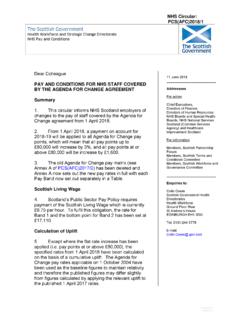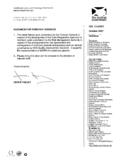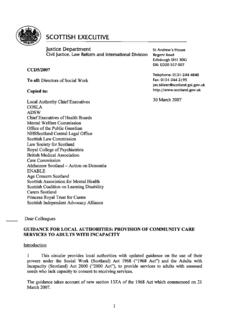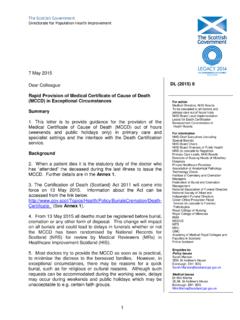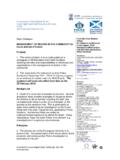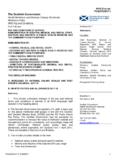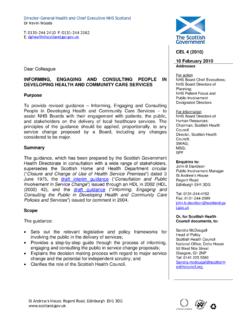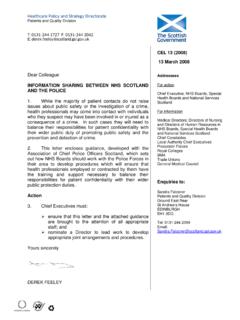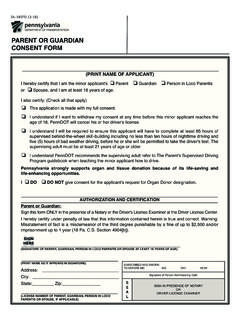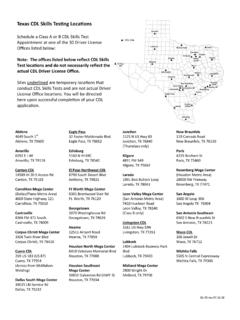Transcription of Chief Nursing Officer Directorate Fiona McQueen, …
1 1 Chief Nursing Officer Directorate Fiona mcqueen , Chief Nursing Officer T: 0131-244 2314 F: 0131-244 3465 E: Chief Executives All NHS Boards 14 July 2015 Dear Colleague Healthcare Associated Infection (HAI) and Antimicrobial Resistance (AMR) Policy Requirements The purpose of this letter is to confirm the mandatory HAI and AMR policy requirements that require to be adopted and implemented in all NHS healthcare settings and deemed best practice (where relevant) in all non NHS healthcare settings. 1. Introduction The Scottish Government Health and Social Care Directorates (SGHSCD) remain committed to controlling, reducing and preventing Healthcare Associated Infections (HAI) and Antimicrobial Resistance (AMR) across NHSS cotland in order to maintain individual safety within our healthcare settings. Despite the successes in reducing HAIs over recent years, the threat from new and old infectious agents, and AMR continues to increase.
2 Therefore it is important at both a national and NHS Board level, that there is ongoing and increased monitoring for accurate, and as far as is possible real time, current and emerging threat assessments. Data at both national and local levels are essential for planning and evaluation of interventions. Most importantly, the collection of surveillance data with local feedback is an evidenced based approach that can achieve HAI reductions. Antimicrobial resistance (AMR) remains a major public health issue and is a threat to the future of health and healthcare in Scotland. The scale of the threat from antimicrobial resistance and the case for action is set out in the UK Five Year Antimicrobial Resistance Strategy 2013-2018. The SGHSCD is committed to delivering on this agenda and will do so via the Controlling Antibiotics in Scotland (CARS) agenda that is aligned to the UK AMR Strategy.
3 DL (2015) 19 Addresses For action Chief Executives For information Medical Directors SENDs HAI Executive Leads Infection Control Managers Infection Control Doctors Infection Control Nurses Directors of Pharmacy Directors of Public Health Estate and Facilities Leads Health Protection Scotland Health Facilities Scotland NHS Education Scotland Healthcare Improvement Scotland Care Inspectorate Scottish Care Infection Prevention Society (Scottish Branch) Scottish Microbiology and Virology Network Scottish Intensive Care Audit Group Royal College of Nursing SAPG Assoc Scottish Antimicrobial Pharmacists Enquires to: Abigail Mullings, HAI Professional Adviser Alistair Leanord, HAI Medical Adviser Tel: 0131 244 2490/3007 2 NHSS cotland has achieved huge success in the prevention and control of HAI and we would like to thank all staff for their efforts in achieving and sustaining these results. 2. National HAI Surveillance Framework Staphylococcus aureus bacteraemia Staphylococcus aureus (S.)
4 Aureus) bacteraemia remains an important HAI. All NHS Boards are required to continue to collect data on both meticillin resistant S. aureus (MRSA) and meticillin sensitive S. aureus (MSSA) bacteraemias as per the HPS protocol for Staphylococcus aureus bacteraemia surveillance. It is the expectation that all NHS Boards will continue to participate in the enhanced SAB surveillance project as per the HPS protocol for Enhanced Staphyloccus aureus bacteraemia surveillance. MRSA Screening NHS Boards are required to monitor locally, and report nationally to Health Protection Scotland (HPS) compliance with the Clinical Risk Assessment (CRA) as a key HAI Level 3 Indicator as per CNO (2013) 01. Clostridium difficile infection Mandatory surveillance for Clostridium difficile infection (CDI) for patients, aged 15-64 and >65 remains a requirement as per the HPS protocol for CDI. It is expected that NHS Boards follow the national guidance on Prevention and Control of CDI in Healthcare Settings in Scotland and the recommended HPS protocol for diagnosis of CDI.
5 Hospital Level Reporting All NHS Boards are required to submit hospital level Staphylococcus aureus bacteraemia and Clostridium difficile infection data to ECOSS by end September 2017 following the development of a national reporting system. Escherichia coli bacteraemias In recognition of the increasing burden of disease of Escherichia coli bacteraemias, national surveillance will be mandatory from 2016. NHS Boards should collect data on E. coli as per the HPS protocol for E. coli bacteraemia surveillance. Carbapenemase-producing Enterobacteriaceae (CPE) In 2013, a joint Chief Medical Officer (CMO)/ Chief Nursing Officer (CNO)/ Chief Pharmaceutical Officer (CPO) letter described the emerging threat from CPE and the requirements for an acute hospital admission screening programme for CPE. HPS are currently supporting NHS Boards to implement CPE screening. It is the expectation that NHS Boards will inform HPS of confirmed cases as per the current guidance.
6 3 Antimicrobial Resistance NHS Boards are required to implement surveillance of antimicrobial use as described by the Scottish Antimicrobial Prescribing Group Local Surveillance of Antimicrobial Use guidance. This guidance describes the mandatory minimum dataset required of NHS Boards for the surveillance of both Primary and Secondary Care antimicrobial use. Urinary Tract Infection Snapshot Surveillance Boards are required to report the national Urinary Tract Infection (UTI) snapshot surveillance programme as per the protocol for Surveillance of Antimicrobial Resistance in Urinary Isolates in Scotland. Local surveillance of Alert Organisms and Alert Conditions To detect and prevent outbreaks, and to minimise infections resulting from healthcare NHS Boards are required to implement Local Surveillance of Alert Organisms and Alert Conditions as per HPS guidance. Surgical Site Infection Surveillance All NHS Boards are required to undertake surgical site infection (SSI) surveillance of hip arthroplasty and caesarean section surgical procedures as per the HPS protocol.
7 HPS are currently scoping an approach for both Colorectal and Vascular Surgery SSI surveillance. It is the expectation that NHS Boards will participate in this surveillance as per the agreed protocol. HAI in Intensive Care Units All NHS Boards are required to undertake surveillance of HAI within Intensive Care Units as per the HPS/SICSAG protocol. National Point Prevalence Survey (PPS) of HAI To inform future national policy and provide NHS Boards with an epidemiological evidence base for local priority setting and demonstrate NHS Healthcare Quality Strategy HAI outcome measures, all NHS Boards are required to participate in the 2016 ECDC National PPS Survey as per the HPS protocol. 3. National HAI Guidance HAI Compendium The HAI compendium contains a list of all current national policy, guidance and supporting materials on HAI produced since 2001 by the Scottish Government Health and Social Care Directorate , National Services Scotland, other stakeholders and any additional HAI guidance that is applicable for use in NHSS cotland for example, Department of Health and specialist advisory bodies.
8 4 The purpose of the HAI compendium is to provide NHSS cotland staff and healthcare providers/workers with an overview of all current HAI guidance, as well as the key messages from the guidance and all the associated supporting materials checklists, care bundles, patient information leaflets and training scenarios. National Infection Prevention and Control Manual All NHS Boards are required to adopt the National Infection Prevention and Control Manual (NIPCM). All non NHS healthcare settings are required to consider the NIPCM as best practice. It is expected that NHS Boards maintain local assurance of implementation through continuous monitoring in all healthcare settings. NHS Boards are required to demonstrate that they have adopted, implemented and monitor compliance of the NIPCM as part of their Healthcare Environment Inspections. HAI Standards (2015) The revised HAI Standards (2015) specify the minimum level of HAI performance for NHS Boards and apply to all healthcare organisations and practitioners in Scotland, including independent healthcare providers.
9 These HAI Standards detail what patients and the public can expect of healthcare services in Scotland. NHS Boards are required to demonstrate that they have met or are working towards meeting HAI Standards (2015) as part of their Healthcare Environment Inspections. CNO HAI Support Algorithm (2015) The CNO HAI Support Algorithm is mandatory for use in all NHS Boards and is complementary to the Hospital Infection Incident Assessment Tool (HIIAT) process. HAI Outbreak Reporting All HAI-ORT reports are required to be reported to HPS and collected in an outbreak system. To support current infection threat assessments and preparedness activities, and enhance the sharing of lessons learnt across healthcare settings, NHS Boards are required to report all HIIAT Green (Non-Norovirus) assessed reports to HPS from April 2016 following the establishment of a national reporting system. NHS Boards are required to report the number of hospital wards affected by norovirus outbreaks and the number of positive laboratory reports of norovirus in Scotland.
10 HAI SCRIBE It is a requirement for NHS Boards to adopt and implement: SHFN 30 Part A: Manual Information for Design Teams, Construction Teams, Estates & Facilities and Infection Prevention & Control Teams (replaces SHFN 30 Version 3); and SHFN 30 Part B: HAI-SCRIBE Implementation strategy and assessment process (replaces HAI-SCRIBE Version 2). 5 4. Summary NHS Boards must implement the requirements by the requested timescales. Therefore, we request that you immediately draw this letter to the attention of Consultant Microbiologists, HAI Executive Leads, Pharmacy Leads, Antimicrobial Management Team Leads, Infection Prevention Control Teams, Estate and Facility Leads, Directors for Public Health, Senior Charge Nurses, Clinical Governance and Risk Management committees. We greatly appreciate your support and cooperation in ensuring that these mandatory requirements are put into effect within your NHS Board.
